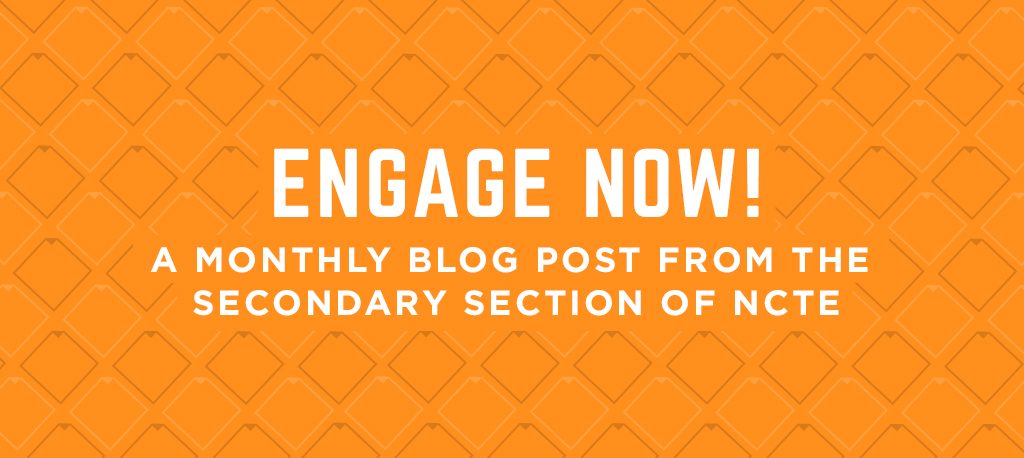This blog post was written by NCTE member and Secondary Section Steering Committee member Vaughn W. M. Watson.
In a May 2018 High School Matters column in English Journal, I discussed building on the “already present” lived experiences of youth as an envisioning of “English teaching and learning as all around us” (Watson, 2018, p. 10). As illustrative practices, I described a 10th-grade student sharing with peers Suli Breaks’ spoken-word poetry on YouTube, youth songwriters in the Verses Project composing words and music about their Detroit hometown, and preservice English teachers discussing the interplay of languages and identities in video games.
In this way, I noted, “building upon the ‘already present’ involves attending to literacy practices and learning activities across communities and within contexts that students see as important to them” (p. 11). This stance-taking seeks to assert urgent possibilities in English teaching and learning, and encourages secondary teachers to build curricular and teaching practices that attend to strengths of youth and communities.
Teachers enrolled in spring 2018 in “Hip-hop Literacies,” a graduate course I designed and taught, envisioned such work in the compiling of a multimodal class playlist. Teachers posted to our online course discussion forum the title, YouTube link, and a one-sentence annotation that described how in their curriculum design and teaching practices, teachers and youth may engage with a YouTube video featuring a creative or artistic practice involving hip hop.
Seven teachers across the semester each contributed eight playlist posts, 56 total, publicly sharing possibilities of teaching and learning with classmates.
Teachers’ annotations of their playlist posts underscore opportunities for discussing a range of topics in secondary English language arts, including action-taking, counter narratives, race, economies, and social change. In conversation with #WhyIWrite, and NCTE’s Statement on Anti-Racism to Support Teaching and Learning, I highlight curricular and learning activities of three teachers who build on the “already-present” lived experiences of youth.
Across teachers’ playlists and annotations, consider for your own schooling contexts how you may build with youths’ lived experiences in developing curriculum and teaching practices drawn from popularized narratives of YouTube videos.
For example, consider asking youth to compile playlists, and one-sentence annotations, across course topics. Then with youth build connections across playlist posts, and youths’ already-present literacy and learning.
Youth, for example, may identify their already-present literacy activities in playlist posts; connect playlists to spaces and places meaningful to youth; or discuss how youths’ already-present literacy and learning connect to or extend in-school academic standards.
Sensoy and DiAngelo’s (2012) book, Is Everyone Really Equal?: An Introduction to Key Concepts in Social Justice Education, and Milner’s 2017 Education Week commentary, Yes, Race and Politics Belong in the Classroom, are additional resources for discussing social justice and equity in building and annotating playlists.
As you read teachers’ playlist posts, consider how you may involve youth in curricular and teaching conversations supporting youths’ already-present literacy and learning within and beyond reading, writing, speaking, and listening activities.
Sarah, 11th-grade teacher, IB Language & Literature; Seattle, Washington
Video title: “Solange — Rise/Weary Medley (Live from The Tonight Show Starring Jimmy Fallon)”
YouTube link: https://www.youtube.com/watch?v=mKwxz23H5UY
Sarah’s annotation: This live performance of “Rise” and “Weary” by Solange speaks to the ebb and flow of being called to action, yet feeling weary and emotionally drained in knowing that there is so much work to be done. In this context I’m interpreting “work” as work = social justice and human rights organizing/efforts.
Video Title: “A Tribe Called Quest – We The People . . . ”
YouTube link: https://www.youtube.com/watch?v=vO2Su3erRIA
Sarah’s annotation: A Tribe Called Quest uses second-person point of view and sarcasm to comment on the gentrification, commodification, and oppression experienced by people who have been marginalized by dominant culture.
Video Title: “The Hamilton Mixtape: Immigrants (We Get The Job Done)”
YouTube link: https://www.youtube.com/watch?v=6_35a7sn6ds
Sarah’s annotation: Teachers can use this to begin a dialogue about how music (and literature) serves as a counter-narrative in dominant culture in a rap about immigrants in context with U.S history.
VideoTitle: “ ‘Black Lives Matter’: A Poem by Nikkita Oliver”
YouTube link: https://www.youtube.com/watch?v=caDFJtjMM3Y
Sarah’s annotation: Leader of ‘The Peoples Party’ in Seattle, Washington, Nikkita Oliver performs a spoken-word poem that critiques oppressive systems and provides a social commentary around race, power, and Black lives which could be used while teaching/reading The Bluest Eye by Toni Morrison to discuss how narratives provide social commentary.
Drexton, 5th-grade teacher; Gwinnett County, Georgia
Video title: “Hip Hop Around The World: Discovering Cultural Identity In The Classroom”
YouTube link: https://www.youtube.com/watch?v=6ixViVMoYRA
Drexton’s annotation: This video discusses how cultures and populations around the world use hip-hop to try and solve or educate about the problems that many low-income communities share regardless of their location.
Dan, 11th-grade world history teacher; Detroit, Michigan
Video title: “Kanye West – All Falls Down ft. Syleena Johnson”
YouTube link: https://www.youtube.com/watch?v=8kyWDhB_QeI
Dan’s annotation: This song can open up student conversations on materialism, self-worth, self-confidence, and the functions of capitalist economies as it relates to people.
Video title: “Black Thought Freestyles on Flex | #Freestyle087”
YouTube link: https://www.youtube.com/watch?v=prmQgSpV3fA
Dan’s annotation: The Roots’ Black Thought delivers almost 10 minutes of lyrical dexterity and depth.
Video title: “How this legendary hip-hop producer humanized a machine”
Link: https://www.vox.com/videos/2017/12/6/16742248/j-dilla-humanized-mpc3000
Dan’s annotation: In honor of J Dilla week [a celebration of the life and work of hip hop artist and music producer J Dilla, who passed away in 2006], teachers can use this video to discuss how students can use their ingenuity to make magic out of machines.

Vaugh W. M. Watson is assistant professor in the Department of Teacher Education, Michigan State University, East Lansing.

